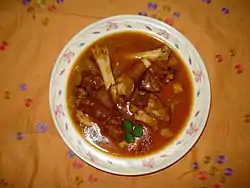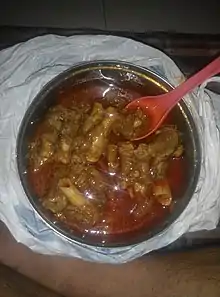Paya (food)
,Paya[1] is a traditional food from South Asia. It is served at various festivals and gatherings, or made for special guests. Paya means 'leg'/'feet' in Hindi/Urdu.[2] The main ingredients of the dish are the trotters (hooves) of a cow, goat, buffalo , or sheep, cooked with various spices.
 Paya curry | |
| Alternative names | Siri Paya |
|---|---|
| Type | Soup or curry |
| Course | Breakfast |
| Region or state | South Asia |
| Associated cuisine | Pakistani Bangladesh Indian |
| Main ingredients | Trotters or hoof (goat, beef, buffalo, or sheep), onions, tomatoes, garlic, and other spices |
Origins
The paya originated from the amalgamation of South Asian Pakistan and Central Asian cuisine. The dish was adapted by the cooks of Lahore, Hyderabad of Telangana State , and Lucknow.[3]
Subsequently, paya became popular all over present-day India, Pakistan and Bangladesh. Outside of the Indian subcontinent, paya is available in restaurants that serve South Asian cuisine. In Delhi, it is sometimes also referred to as khurode from the word khur meaning foot or hoof. The Hindi word khur is itself derived from Sanskrit khura.
Recipes

Recipes for this dish vary regionally. The soup base is created by sautéed onions and garlic, where several curry-based spices are then added to the meat and bones. The cooked dish is served with a garnish of fresh diced ginger and fresh long coriander leaves, along with fresh sliced lemon.[4]
Cooking methods
It is cooked on mild heat for hours (usually overnight) on the stove. However, nowadays it is mostly cooked in a pressure cooker.
Historically, when people used wood or coal as a cooking fuel, preparation of this dish would start at night, slow cooking it in the coals until the morning. This dish has a soup-like consistency and is usually eaten as a breakfast food in the winter months with naan.
Variations
There are many variations[5] of this dish. A popular one is siri paya (سری پایا, सिरी पाया),[6] where Siri means the head of an animal. It is considered a delicacy.
See also
References
- "Tamil Attukaal Paya (ஆட்டுக்கால் பாயா)" (in Tamil). Vikatan. 2017. Retrieved 1 February 2020.
- "पाया (Paya) meaning in English - पाया मीनिंग - Translation". Hinkhoj. 2007. Retrieved 5 June 2018.
- "Paya In Shorba & Salan". Upper Crust Magazine. Retrieved 15 April 2014.
- Bapsi Sidhwa (2005). City of Sin and Splendour: Writings on Lahore. Penguin Books.
- Paya recipes | KhanaPakana.com
- Special Siri Paye (Mutton Trotters) سپیشل سری پائے - Chef Shazia